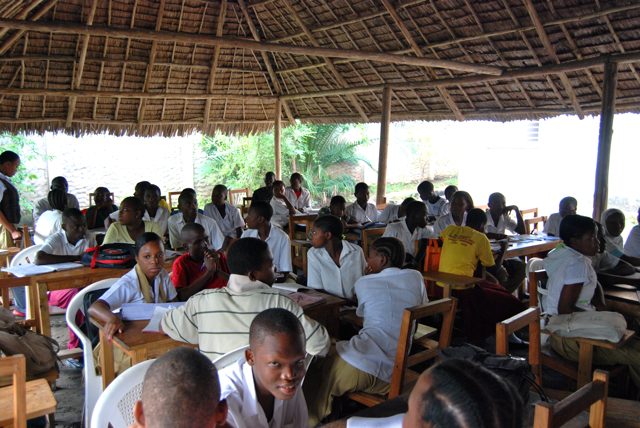
The morning Second Chance project students study Geography, Civics, History and Swahili. They also study English diligently for two hours a day. They are responsible and dedicated students who are expecting to resit for the QT (Qualifying Test) in November, in hopes of continuing on to form three (grade 9). Ravi, a Canadian volunteer is their teacher and keeps the class enthused and disciplined at all times, he is back on his feet and as healthy as ever after suffering from Malaria and typhoid just one week ago. He also makes a constant effort to learn Swahili, a language which only five weeks ago he had never studied before.
George, Omari, Khadija and a few others study English in the mornings with Hoda, an Australian volunteer, before their afternoon classes. They recognize they need to study before and after class to learn English quickly. Their limited knowledge of English and Swahili respectively often make for interesting interactions.
The girl’s project, also begins at 8am, there is a group of over 40 girls, many of whom have dropped out of school at primary level and would otherwise not have a chance to receive some sort of vocational education. They are currently learning to sow, and the more experienced girls are already making bags, and tapestry items that they will be able to sell in the future. In addition, they study life skills, civics and topics of their own interest. They often help Isabel, one of the new volunteers with her Swahili and read easy children’s books about various subjects such as, AIDS and birds to her. The girls get along well, and find a network of support among themselves. Tea time is everyday at around 11am, and the girls take a rest and eat delicious maandazi (a local variety of fried bread) and biscuits with their tea.
12:30pm is transition time, the morning QT students (Second Chance project) are done for the day and afternoon students begin to arrive. Afternoon students have very limited knowledge of English. As a result, they will be at Chipua for two years. The first year, they will study Englsih exclusively for three hours every afternoon. The afternoon group is divided into two groups of about 25 - 30 students each. Currently, the two groups are taught by Abduli, a former student of Chipua and Isabel. As you observe the classrooms, you can hear the students repeat, hair, eye and ear, terms they often confuse while they learn body parts. At another moment, students moan and complain because Isabel has asked them to write their new vocabulary words 10 times. They do not understand the task but the teacher knows there is value behind repetition.
Afternoons are also dedicated to cleaning and maintenance. Ravi fixes a desk in the office, while Mudy and Idy, two former Chipua students, help clean and clear out the storage room. Ravi’s belief in turning nothing into something is dramatically changing the appearance of Chipua in a few short weeks. Students that have recently passed the QT examination come and go while they keep Chipua informed of their future plans and search among their family members for support to continue on to secondary school. Students are given homework for the next day and reminded that they will never learn English if they do not study at home.
Thus a day at Chipua culminates at about 4pm. Days are sometimes hectic, or affected by the rain but all in all old and new projects continue, and there are many students who throughout the years are grateful to Chipua for the education and second opportunities they received there.

 RSS Feed
RSS Feed